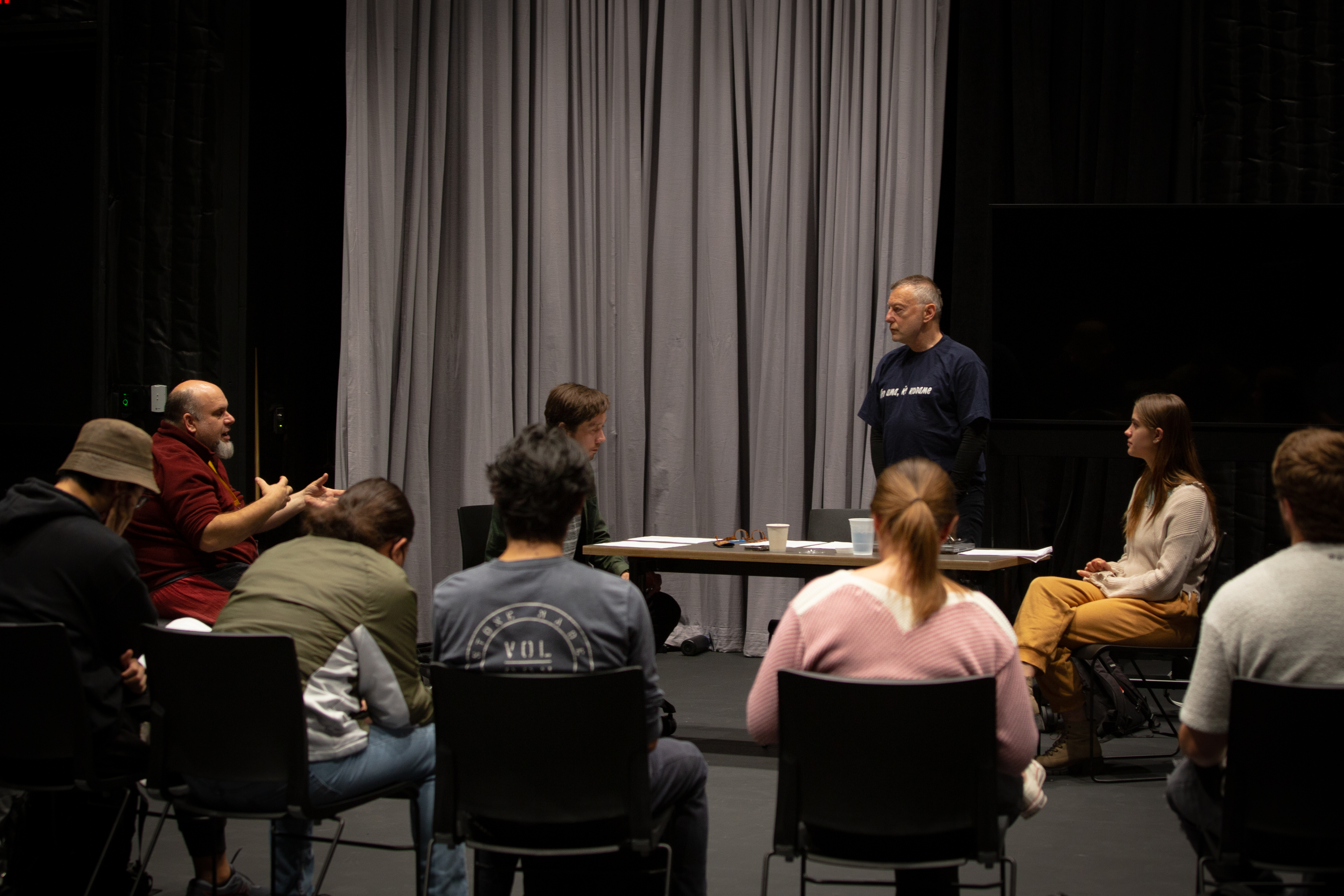Independent filmmaker Milcho Manchevski visited Arizona State University this February for a weeklong residency where he shared his perspectives on storytelling with students and the greater Tempe community.
Since his debut feature “Before the Rain,” which won the 1994 Golden Lion at Venice and was nominated for an Oscar for Best International Feature Film, Manchevski has written and directed seven feature films, as well as worked in TV, photography and short film.
During his visit, he streamed three of his movies — “Before the Rain (1994),” “Mothers” (2010) and “Bikini Moon” (2017) — where attendees had the opportunity to learn more about each story’s journey from page to screen.
Manchevski also taught a master class in filmmaking for students in The Sidney Poitier New American Film School, in collaboration with ASU faculty Jason Scott and Luiza Parvu. The class provided hands-on experience in working with actors and storyboarding, and at the end of the class, teams of students produced a short film.
“Manchevski's filmmaking workshop, and the thoughts he generously shared from his impressive career, reminded us of what is at stake in a true writer-director's work,” said Parvu, an assistant professor in The Sidney Poitier New American Film School. “The possibility to find, in collaboration with the cast, creative crew members and audiences, a kind of truth about human nature that cannot be expressed or found otherwise.”
Daniel Beck, a film student who took the master class, said the experience was “eye-opening and life-changing.”
“I gained insights into the creative process and the importance of being open to new ideas and perspectives,” Beck said. “Milcho’s teaching was such a tremendous experience to have at the film school.”
Independent filmmaker Milcho teaches students from The Sidney Poitier New American Film School during a masterclass as part of his weeklong residency at ASU in February. Photo by Ari Gajraj
On Feb. 15, Manchevski delivered the 2023 Mary Choncoff Lecture, titled “Based on a True Story: Confessions of a Recovering Writer-Director,” on the Tempe campus.
The Choncoff Lecture, hosted by the Melikian Center for Russian, Eurasian and East European Studies, was established to sustain and expand the relationship between Arizona and North Macedonia. Manchevski first visited Tempe in 1977 as a high school exchange student, through the sister-city program that has connected Tempe and Skopje, the capital of North Macedonia, for more than 50 years.
Manchevski’s residency concluded with a presentation to Professor Lance Gharavi’s popular Introduction of Storytelling class, where Manchevski screened his award-winning short film “The End of Time,” which was shot in Cuba.
“'The End of Time' sparked a fascinating discussion among the students about its vivid, formal elements,” Gharavi said. “In a subsequent class, we discussed how the film seemed to violate the three-act-structure that other guest lecturers had insisted was an imperative for filmmakers.”
Faculty and students especially appreciated Manchevski’s sense of humor, openness and his creative commitment.
“He’s chosen a singular artistic path,” said Steven Beschloss, director of ASU’s Narrative Storytelling Initiative. “He’s remained committed to a life and career defined by his own vision, and has found a way to keep evolving as a filmmaker and storyteller.”
“Manchevski's work showed our students that being a filmmaker does not have to be about obeying rules, fitting inside a box or copying the latest box office hits,” Parvu said, “but, however, that rigor and discipline are worthy companions on an artists' journey.”
Top image: Independent filmmaker Milcho Manchevski delivers the 2023 Mary Choncoff Lecture on Feb. 15 at the Tempe campus as part of his weeklong residency at ASU. Photo by Ari Gajraj
Written by Keith Brown, director of the Melikian Center for Russian, Eurasian and East European Studies.
More Arts, humanities and education

From ASU to the open road: Alumna Gabriella Shead builds a career behind the scenes of Broadway tours
For ASU alumna Gabriella Shead, a career in the theater isn’t about taking center stage — it’s about making sure everything behind the curtain runs seamlessly. Now serving as assistant company…
Canon brings ‘Star Wars’ cinematographer to inspire Poitier Film School students
David Klein never had a mentor.He was scrappy — and lucky — enough to succeed without one as a career cinematographer. His first feature film was the no-frills, DIY darling of ‘90s indie cinema…

Illuminating the season: How a business professor turns holiday lights into lessons on creativity and sustainability
On a December night in Chandler, Arizona, Kevin Dooley’s house doesn’t just twinkle. It beams like a beacon at the end of the cul-de-sac as the windows shimmer with color, and every corner…

